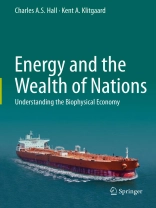For the past 150 years, economics has been treated as a social science in which economies are modeled as a circular flow of income between producers and consumers. In this “perpetual motion” of interactions between firms that produce and households that consume, little or no accounting is given of the flow of energy and materials from the environment and back again. In the standard economic model, energy and matter are completely recycled in these transactions, and economic activity is seemingly exempt from the Second Law of Thermodynamics. As we enter the second half of the age of oil, and as energy supplies and the environmental impacts of energy production and consumption become major issues on the world stage, this exemption appears illusory at best. In Energy and the Wealth of Nations, concepts such as energy return on investment (EROI) provide powerful insights into the real balance sheets that drive our “petroleum economy.” Hall and Klitgaard explore the relation between energy and the wealth explosion of the 20th century, the failure of markets to recognize or efficiently allocate diminishing resources, the economic consequences of peak oil, the EROI for finding and exploiting new oil fields, and whether alternative energy technologies such as wind and solar power meet the minimum EROI requirements needed to run our society as we know it. This book is an essential read for all scientists and economists who have recognized the urgent need for a more scientific, unified approach to economics in an energy-constrained world, and serves as an ideal teaching text for the growing number of courses, such as the authors’ own, on the role of energy in society.
Jadual kandungan
Part I. Energy and the Origins of Wealth Chapter 1. Poverty, Wealth, and Human Ambition Chapter 2. Energy and Wealth Production: An historical perspective Chapter 3. The Petroleum Revolution I: The first half of the age of oil Part II. Energy, Economics and the Structure of Society Chapter 4. Explaining Economics from an Energy Perspective Chapter 5. The Limits of Conventional Economics Chapter 6. The Petroleum Revolution II: Concentrated Power and Concentrated Industries Chapter 7. The Postwar Economic Order, Growth and the Hydrocarbon Economy Chapter 8. Globalization and Efficiency Chapter 9. Are there Limits to Growth? Examining the Evidence Part III. Energy and Economics—the Basics Chapter 10. What is Energy and How is it Related to Wealth Production?Chapter 11. The Basic Science Needed to Understand the Relation of Energy to Economics Chapter 12. The Required Quantitative Skills Chapter 13. Economics as Science: Social or Biophysical? Part IV. The Science Behind How Economies Work Chapter 14. Energy Return on Investment Chapter 15. Peak Oil, EROI, Investments and Our Financial Future Chapter 16. The Role of Economic Models for Good and Evil Chapter 17. How to do Biophysical Economics Part V. Understanding How Real World Economies Work Chapter 18. Peak Oil, the Great Recession and the Quest for Sustainability Chapter 19. Environmental Considerations: Beyond Externalities Chapter 20. Living the Good Life in a Lower EROI World
Mengenai Pengarang
Charles A.S. Hall is a Systems Ecologist who received his Ph D under Howard T. Odum at the University of North Carolina at Chapel Hill. Dr. Hall is the author or editor of seven books and more than 250 scholarly articles. He is best known for his development of the concept of EROI, or energy return on investment, which is an examination of how organisms, including humans, invest energy into obtaining additional energy to improve biotic or social fitness. He has applied these approaches to fish migrations, carbon balance, tropical land use change and the extraction of petroleum and other fuels in both natural and human-dominated ecosystems. Presently he is developing a new field, biophysical economics, as a supplement or alternative to conventional neoclassical economics, while applying systems and EROI thinking to a broad series of resource and economic issues. Kent A. Klitgaard is Professor of Economics and the Patti Mc Gill Peterson Professor of Social Sciences at Wells College in Aurora, New York, where he has taught since 1991. Kent received his Bachelor’s degree at San Diego State University and his Master’s and Ph D at the University of New Hampshire. At Wells, he teaches a diverse array of courses including the History of Economic Thought, Political Economy, Ecological Economics, The Economics of Energy, Technology and the Labor Process, and Microeconomic Theory, and is a co-founder of the Environmental Studies Program. Kent is active in the International Society for Ecological Economics, and is a founding member of the International Society for Biophysical Economics. Recently, his interests have turned towards the degrowth movement, and he has published multiple papers on the subject for Research and Degrowth. He has two children, and is interested in the outdoors in general: from hiking to beach walking to the occasional round of golf (despite the high energy use of golf courses). Kent is a Californian who still surfs the frigid waters of New England when he gets a chance. This is his first book.












